Energy drink addiction: prevalence, symptoms, side effects, withdrawal, and treatment
Table of content
- What is energy drink addiction?
- How common is energy drink addiction?
- What are the symptoms of energy drink addiction?
- What are the side effects of energy drink addiction?
- What are the risk factors for energy drink addiction?
- What are the symptoms of energy drink withdrawal?
- What are the treatment options for energy drink addiction?
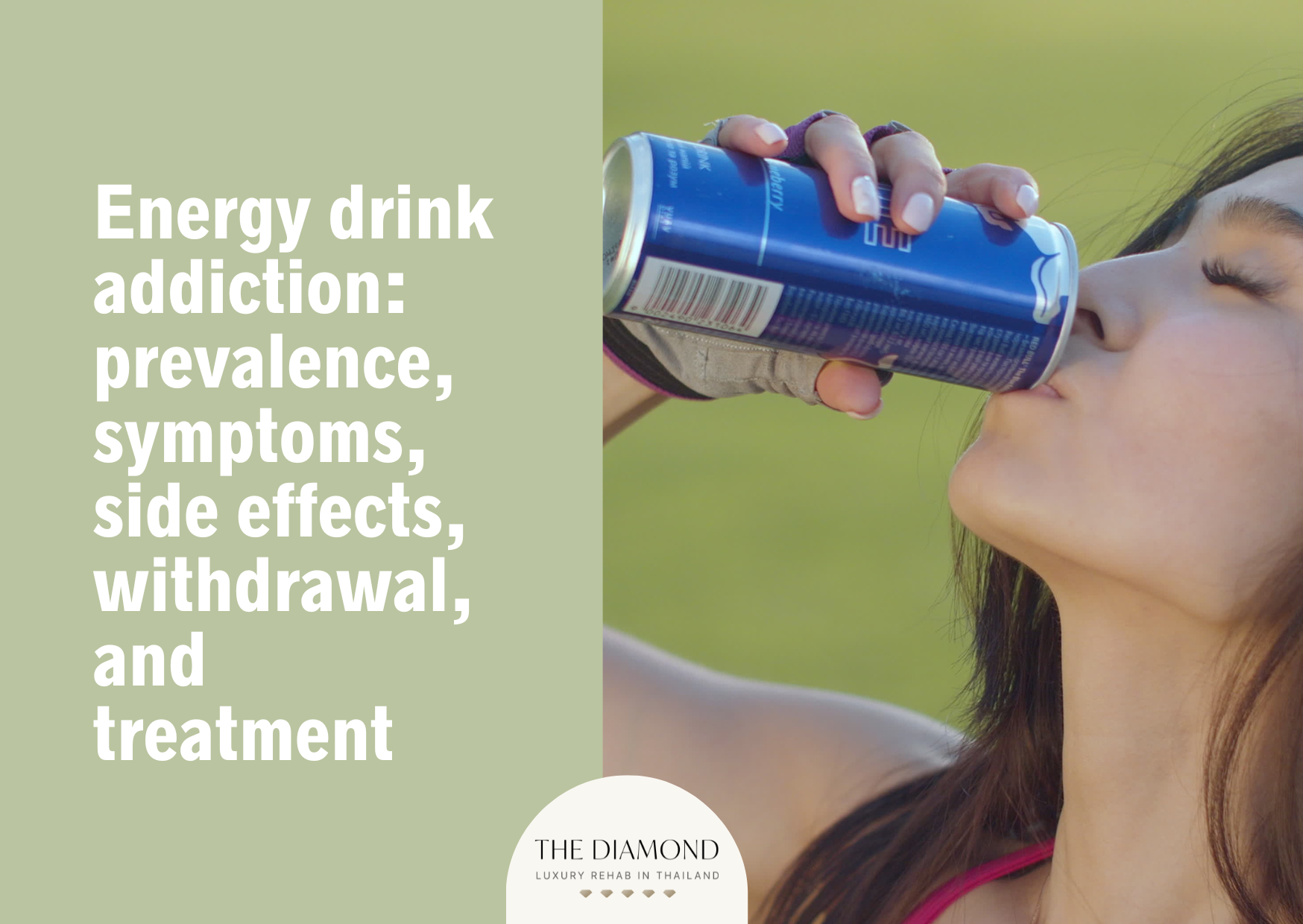
Energy drink addiction describes a pattern of compulsive and excessive energy drink intake in spite of detrimental effects on one’s health or way of life. People who develop such a form of dependence often crave products like Red Bull to maintain alertness or fight fatigue.
The prevalence of energy drink addiction remains difficult to measure due to limited data, but reported figures show a 64% lifetime use rate and 39% recent use among adolescents in the United States, highlighting widespread consumption despite marketing efforts targeting young adults.
The symptoms of energy drink addiction include cravings, increased tolerance, withdrawal symptoms, disrupted sleep, mood changes, compulsive use and physical discomfort.
The side effects of energy drink addiction are increased heart rate, palpitations, stomach pain, insomnia, hypertension, heightened anxiety, irritability, disrupted daily routines, social withdrawal, weight gain and tooth decay.
The symptoms of energy drink withdrawal include headaches, restlessness, fatigue, constipation, difficulty concentrating and depressed mood.
Treatment options for energy drink addiction include counseling, medical management, gradual reduction, lifestyle changes, nutritional support, sleep optimization and digital detox strategies.
What is energy drink addiction?
Energy drink addiction involves the habitual intake of excessive amounts of energy drinks, often driven by a psychological or physical need for stimulation. Elevated concentrations of caffeine and sugar in these beverages induce potentially addictive effects for persons who depend on them for daily energy enhancement.
Regular consumption leads to dependence, where skipping a dose triggers uncomfortable symptoms like headaches and extreme fatigue. Energy drinks tend to disrupt sleep cycles, make anxiety worse or lead to long-term health problems.
Why are energy drinks addictive?
Energy drinks are addictive due to their high content of stimulating substances, mainly caffeine and added sugar. The caffeine in such beverages functions as a central nervous system (CNS) stimulant, enhancing alertness and lowering fatigue, resulting in habitual consumption.
Through activating the brain’s reward system and creating cravings similar to the ones brought on by other addictive substances, added sugar contributes to addiction. Caffeine addiction exacerbates the symptoms and frequently leads to deeper psychological reliance and increased cravings.
Recurrent use builds tolerance, meaning larger amounts are needed to feel the same effects. The cycle makes a habit-forming pattern more powerful and is frequently hard to break. The combined impact of caffeine and sugar leads to psychological dependence, where individuals feel the need to consume energy drinks to function normally.
How common is energy drink addiction?
Reliable statistics on energy drink addiction are limited, but a 2018 study by Miller et al., titled “Caffeinated Energy Drink Use by U.S. Adolescents Aged 13-17: A National Profile” reported a high lifetime use rate of 64% and recent use at 39% among U.S. adolescents, suggesting widespread popularity despite marketing aimed at young adults.
Additionally, the 7.6% weekly use rate and the 7.1% of users consuming energy drinks 100 or more times point to a small but considerable number of heavy users potentially at risk for negative effects.
Common reasons for use included compensating for lack of sleep (more prevalent among girls) and playing sports (more prevalent among boys), indicating reliance on energy drinks for functional purposes, a potential precursor to dependence.
What are the symptoms of energy drink addiction?
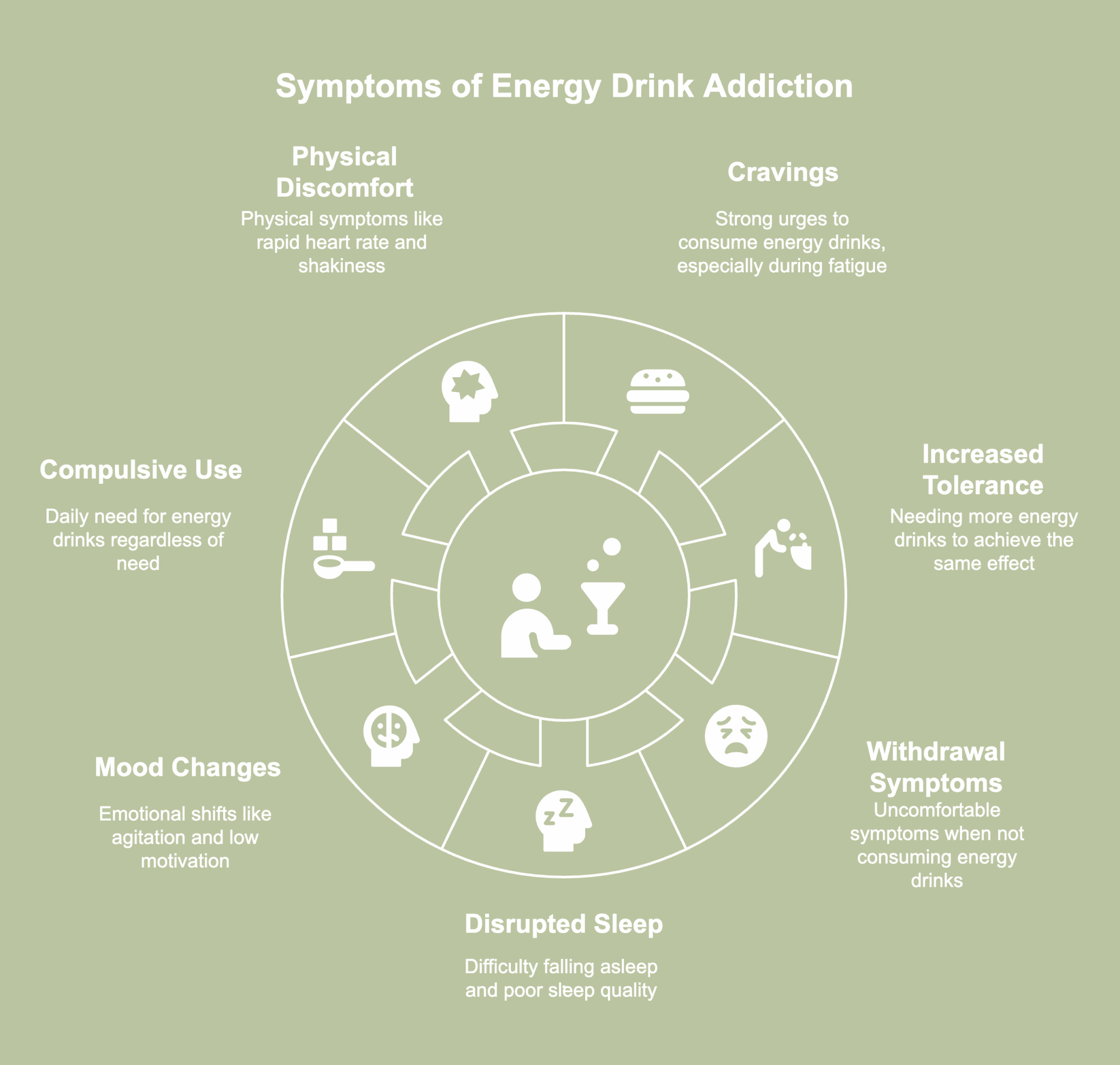
Symptoms of energy drink addiction describe indicators suggesting a person has developed a dependence on energy drinks. The symptoms of energy drink addiction are listed below.
- Cravings: A person with energy drink addiction usually feels a strong urge to consume such beverages, especially during periods of fatigue. Cravings tend to appear at specific times of day, such as during late at night. The desire for stimulation overrides healthier coping methods like rest or hydration. The persistent craving involves products like Monster or 5-Hour Energy.
- Increased tolerance: With time, the body adapts to regular intake, requiring larger quantities to achieve the same energizing effect. What began as one daily drink slowly turns into two or more without noticeable awareness. Growing tolerance signals a deeper dependence developing beneath the surface. The stimulant effect weakens even as intake increases.
- Withdrawal symptoms: Missing a usual dose brings uncomfortable withdrawal symptoms. Symptoms start just hours after skipping a drink. Tasks feel harder and concentration drops without the expected amount of caffeine in one’s system. The unpleasant sensations push the person back into regular use.
- Disrupted sleep: Heavy use of energy drinks interferes with the body’s natural sleep rhythm, especially when consumed late in the day. Falling asleep takes longer and the quality of rest declines. A 2019 report by Richard Kalima Mwape and David Mulenga, titled “Consumption of Energy Drinks and Their Effects on Sleep Quality among Students at the Copperbelt University School of Medicine in Zambia” revealed energy drink users have more than 13 times the odds of having poor sleep quality compared to non-users, indicating a clear correlation between energy drink use and poor sleep quality among participating medical students.
- Mood changes: Emotional shifts become more noticeable, including periods of agitation, nervous energy or low motivation. Mood alterations follow the temporary effects of the drink wearing off. The mind begins to rely on external stimulation to feel balanced. Without the caffeine fix from energy drinks, emotional control starts to slip.
- Compulsive use: Energy drinks shift from being an occasional boost to a daily must-have, regardless of need or timing. Affected individuals continue drinking before bed, during illness or even when already feeling overstimulated. The habit starts to feel automatic, as if the body is on autopilot. Energy drinks often become deeply embedded in everyday rituals, with little awareness of how much control the behavior has gained.
- Physical discomfort: Regular overuse of energy drinks leads to physical discomfort. Symptoms like rapid heart rate and shakiness often follow multiple servings and signal overstimulation in the body. Rather than recognizing the sensations as warning signs, the user grows used to the experience. Prolonged exposure increases strain on the heart and nervous system.
What are the side effects of energy drink addiction?
Side effects of energy drink addiction refer to the negative physical, emotional and behavioral consequences resulting from prolonged or excessive use of highly caffeinated beverages. The side effects of energy drink addiction are indicated in the table below.
| Side Effects of Energy Drink Addiction | |
| Side Effect | Description |
| Increased heart rate | A rapid increase in heart rate, brought on by energy drink’s high caffeine content, places extra stress on the cardiovascular system. |
| Palpitations | Excessive consumption of energy drinks lead to heart palpitations, characterized by an irregular or unusually rapid heartbeat. |
| Stomach pain | Persistent discomfort or cramping in the abdomen caused by high acidity and repeated intake |
| Insomnia | Ongoing inability to fall asleep or stay asleep, often worsened by late-day consumption |
| Hypertension | Elevated blood pressure triggered by excessive caffeine, placing added strain on the heart |
| Heightened anxiety | A constant sense of nervousness or unease, intensified by overstimulation of the nervous system |
| Irritability | Short temper and increased sensitivity to stress appearing between doses |
| DIsrupted daily routines | Dependence on energy drinks interferes with eating, sleeping and productivity patterns |
| Social withdrawal | Gradual isolation due to fatigue or prioritizing use over social engagement |
| Weight gain | Excess calorie intake from added sugars contributes to gradual weight increase over time |
| Tooth decay | High sugar and acid content erodes enamel, increasing the risk of cavities and dental problems |
The way an addiction to energy drinks affects one’s physical health and ability to go about daily life is mirrored in the side effects. Recognizing signs early provides a chance to reduce long-term harm.
What are the risk factors for energy drink addiction?
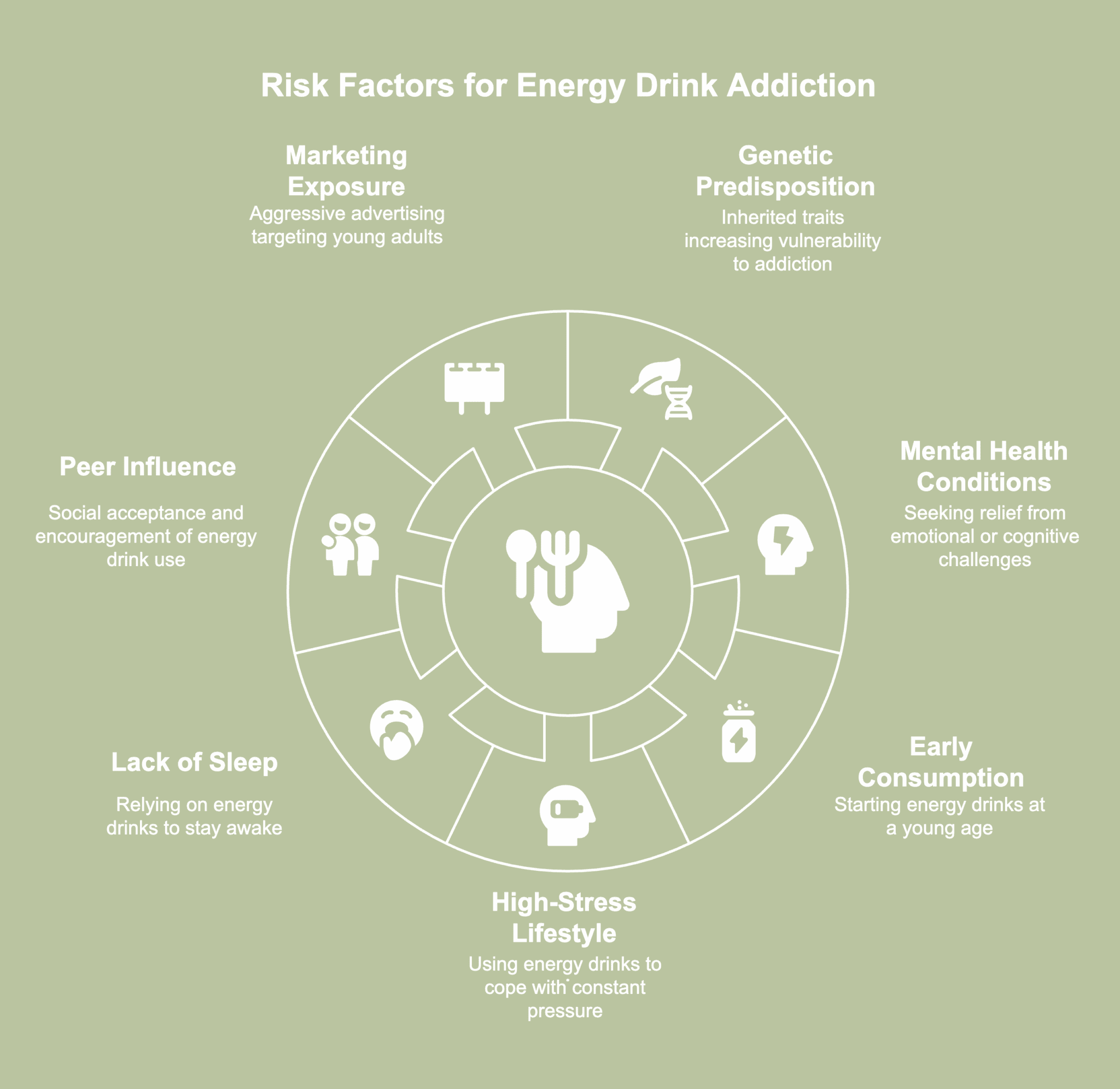
Risk factors for energy drink addiction refer to the traits or situations making someone more likely to become dependent on energy drinks. The risk factors for energy drink addiction are listed below.
- Genetic predisposition: Certain individuals inherit traits increasing vulnerability to addictive behaviors, including caffeine dependence. Such inherited patterns influence how the brain responds to stimulation and rewards. Without early awareness, an inherited risk silently drives the addiction.
- Pre-existing mental health conditions: Individuals facing emotional or cognitive challenges often seek temporary relief to feel more in control. The stimulating effects provide short-term comfort, but long-term use worsens the underlying issues. As per a 2016 report by Gareth Richards and Andrew P. Smith, titled “A Review of Energy Drinks and Mental Health, with a Focus on Stress, Anxiety, and Depression,” chronic energy drink use is linked to higher levels of anxiety and stress, and to a lesser degree, depression. Caffeine, the principal component of energy drinks, is probably responsible for the observed correlations with mental health issues, according to the analysis. Caffeine has been associated with psychiatric diseases.
- Frequent consumption at a young age: Starting energy drinks early in life increases the likelihood of developing a dependency. Developing brains in younger people respond more intensely to stimulating substances. Curiosity and a tendency to experiment heighten the risk of repeated use. As the pattern continues, the body begins to rely on caffeine rather than natural energy, making the habit harder to break over time.
- High-stress lifestyle: People living with constant pressure, deadlines or emotional strain turn to energy drinks for quick relief. The temporary boost creates a sense of increased ability to meet demands. However, repeated reliance replaces healthier coping mechanisms. Over time, stress and caffeine form a cycle reinforcing the addiction.
- Lack of sleep: Poor sleep habits push individuals to seek something powerful enough to keep the mind awake and alert throughout the day. Energy drinks become the easiest option, offering a fast and accessible solution. Continued use disturbs sleep further, leaving the person even more tired the next day.
- Peer influence: In social settings where energy drinks receive wide acceptance or encouragement, frequent use becomes easier to normalize. Friends or colleagues often present energy drinks as helpful during late nights or long shifts. The behavior spreads quickly, especially in group environments like school or the workplace. Once regular consumption becomes part of a shared routine, quitting feels socially uncomfortable.
- Marketing exposure: Aggressive advertising often targets young adults and teenagers with promises of enhanced focus, performance and confidence. Such messages shape perceptions and create emotional associations with the product. Exposure to online energy drink marketing is a strong predictor of energy drink intake, indicating teenagers who see online ads are more likely to consume energy drinks, according to a 2022 study by Yang et al., titled “Excessive Gaming and Online Energy-Drink Marketing Exposure Associated with Energy-Drink Consumption among Adolescents.”
What is the relation between energy drink addiction and exercise addiction?
The relation between energy drink addiction and exercise addiction often involves cross-addiction, where both behaviors reinforce each other through a shared need for stimulation and control.
Energy drinks become a regular tool to boost performance before physical activity, gradually turning into a crutch. The reliance grows stronger as workouts begin to feel incomplete without caffeine.
Over time, the stimulant masks fatigue, encouraging longer or more intense sessions. People with exercise addiction use energy drinks to maintain momentum, even when rest is needed. The need to perform overrides caution, and moderation becomes nearly impossible.
Energy drink dependence reinforces obsessive exercise patterns. Together, the two conditions increase the risk of burnout, physical strain and long-term health issues.
What are the symptoms of energy drink withdrawal?
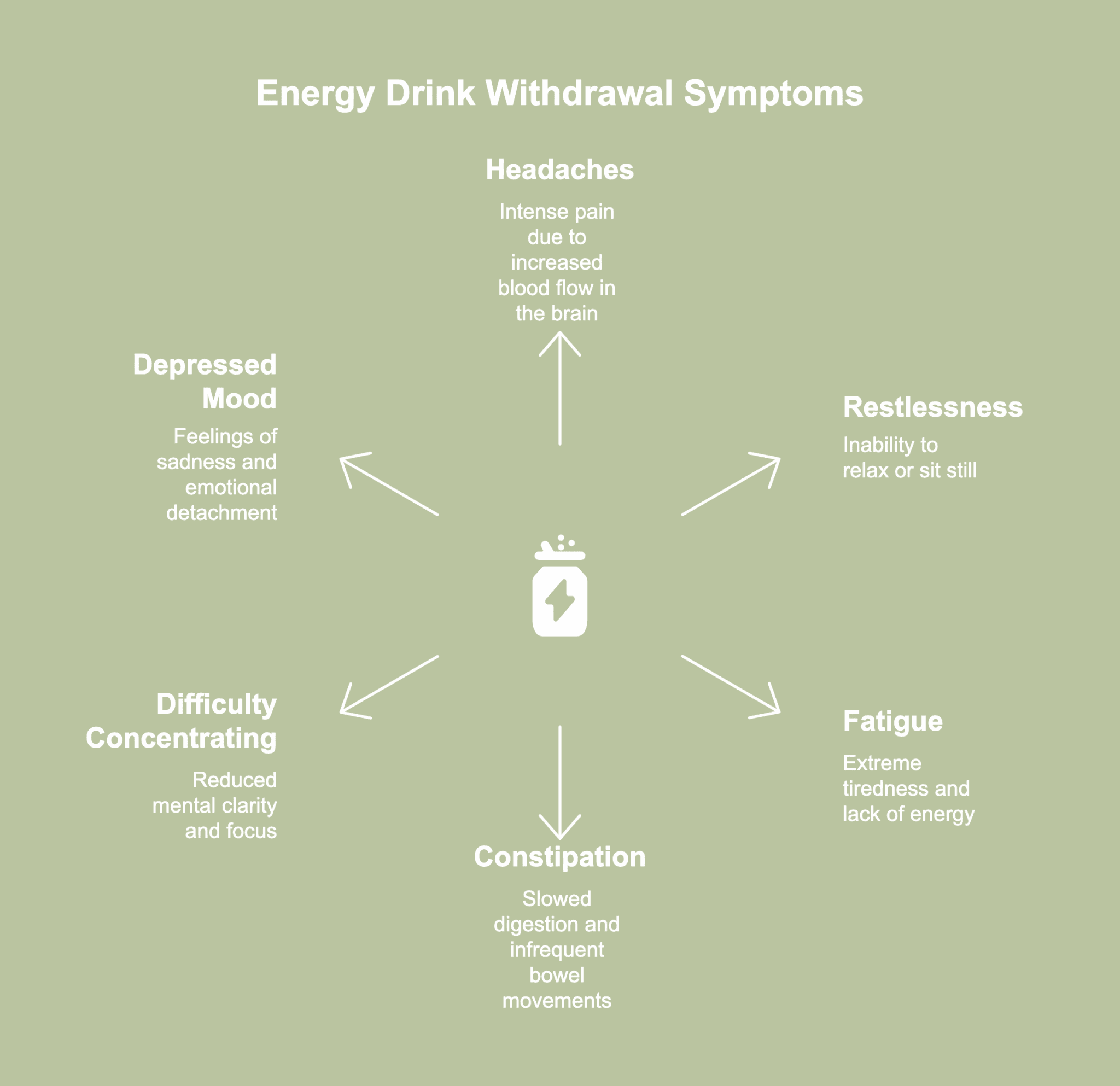
Symptoms of energy drink withdrawal refer to the physical and psychological reactions after reducing or stopping regular intake of highly caffeinated energy drinks. The symptoms of energy drink withdrawal are listed below.
- Headaches: Headaches often appear within the first day of stopping energy drink use. According to a 2023 paper by Zduńska et al., titled “Caffeine for Headaches: Helpful or Harmful? A Brief Review of the Literature,” caffeine withdrawal headaches occur 12–24 hours after stopping chronic caffeine intake (at least 100 mg per day). The headache occurs because, without caffeine, adenosine receptors become more active, leading to widened blood vessels and increased blood flow to the brain, triggering the pain.
- Restlessness: Without caffeine’s stimulating effects, the body struggles to settle into a relaxed state. Individuals feel constantly on edge or unable to sit still for extended periods. The internal unease disrupts focus and increases overall discomfort during daily tasks. Movement or pacing becomes a way to release the excess nervous energy building up during withdrawal.
- Fatigue: When caffeine intake stops, the body struggles to stay alert without artificial stimulation. Tasks once considered easy suddenly feel exhausting and mentally draining. Energy dips throughout the day become more noticeable and harder to push through. Persistent tiredness leads to reduced motivation and lower overall productivity.
- Constipation: Caffeine plays a role in stimulating bowel movements. Stopping intake consequently slows digestion. The digestive tract adjusts slowly, resulting in less frequent movements and occasional discomfort. Bloating or heaviness in the abdomen occurs during this period. Increased water intake and dietary fiber help ease the transition back to regular function.
- Difficulty concentrating: Mental clarity declines after the brain no longer receives a regular supply of stimulants. Processing information becomes slower, and multitasking feels more mentally taxing. Affected persons report feeling mentally foggy, as if thoughts are harder to organize or hold in focus. Sluggish thinking tends to interfere with learning, decision-making or problem-solving.
- Depressed mood: The absence of dopamine-triggering effects from caffeine and sugar creates a noticeable drop in mood. Feelings of dullness, low energy and emotional detachment are common in the early stages of withdrawal. Enjoyable activities feel less rewarding, and motivation to engage with others decreases. Emotional changes usually fade after a few days as brain chemistry begins to stabilize.
What are the treatment options for energy drink addiction?
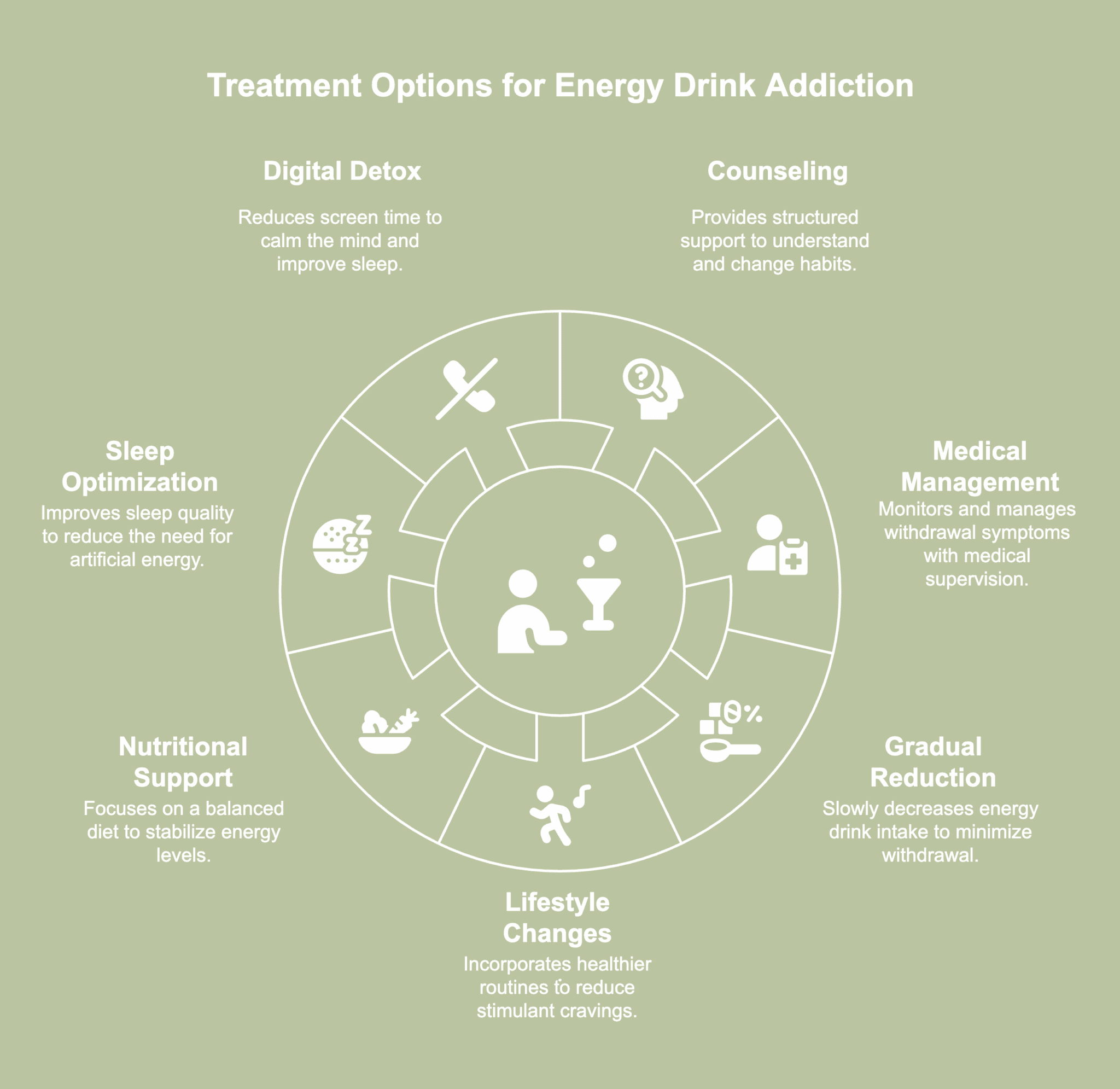
Treatment options for energy drink addiction refer to the programs put in place to help people cut back or quit drinking energy drinks altogether. The treatment options for energy drink addiction are listed below.
- Counseling: Counseling provides a structured space to explore the reasons behind excessive energy drink use. Trained professionals help identify behavioral patterns reinforcing the habit. Individuals acquire more effective coping mechanisms for fatigue and stress through facilitated sessions. One’s dedication to change and the quality of long-term results are both enhanced by consistent assistance.
- Medical management: Certain individuals addicted to energy drinks respond well to medical supervision, especially during withdrawal. Doctors monitor heart rate, blood pressure and sleep disturbances that appear after quitting. Specific cases require short-term medication to reduce severe symptoms such as anxiety or headaches.
- Gradual reduction: Slowly cutting back on energy drink consumption allows the body to adjust without triggering intense withdrawal symptoms. Gradual reduction lowers caffeine dependence step by step instead of shocking the system. Measuring intake and setting weekly limits builds a realistic path toward quitting.
- Lifestyle changes: Building healthier routines reduces the urge to reach for stimulants. Replacing energy drinks with water or other natural sources of energy supports the recovery process. Prioritizing consistent sleep and balanced meals helps stabilize energy levels throughout the day. Over time, small habit changes restore the body’s natural rhythm.
- Nutritional support: A nutrient-rich diet helps counteract the physical impact of caffeine and sugar dependence. Dietitians recommend foods promoting sustained energy rather than quick spikes followed by crashes. A 2024 paper by Xu et al., titled “Energy Drinks: A Clinical Primer and National Data Update” recommends routine primary care assessments must incorporate screening for diabetes and dental caries, considering the elevated sugar content of energy drinks.
- Sleep optimization: Improving sleep quality reduces the perceived need for artificial energy. Establishing a consistent bedtime routine trains the body to feel alert during waking hours. Avoiding screens before sleep and creating a calm environment encourage deeper rest. Restorative sleep plays a key role in physical recovery and emotional stability.
- Digital detox strategies: Frequent pairing of energy drink use with late-night screen time reinforces both habits. Structured breaks from digital devices reduce overstimulation, especially during nighttime hours. A calmer mental state makes it easier to fall asleep naturally without needing caffeine. A 2023 study by Paige Coyne and Sarah J. Woodruff, titled “Article Taking a Break: The Effects of Partaking in a Two-Week Social Media Digital Detox on Problematic Smartphone and Social Media Use, and Other Health-Related Outcomes among Young Adults” revealed how a two-week social media digital detox considerably decreased smartphone and social media addiction, boosted mindful eating, decreased stress, lengthened sleep and improved life satisfaction, anxiety and depression.
Can you overcome energy drink addiction on your own?
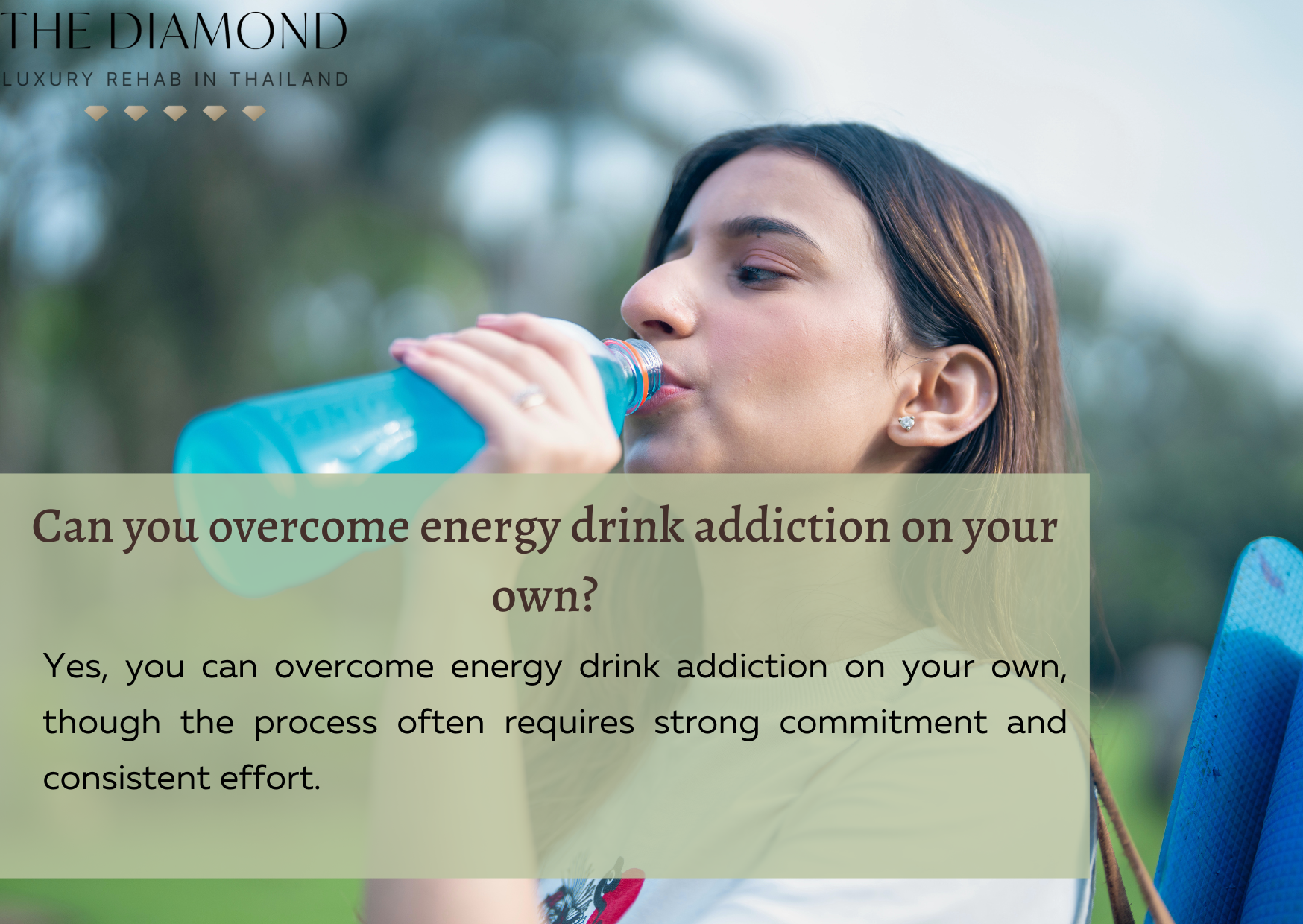
Yes, you can overcome energy drink addiction on your own, though the process often requires strong commitment and consistent effort. Numerous people manage to quit by slowly cutting back on energy drink consumption rather than stopping all at once. Such an approach helps reduce withdrawal symptoms.
A substantial improvement in long-term recovery is achieved by establishing new daily routines designed to support natural energy levels. Developing awareness of emotional triggers like stress or boredom additionally helps reduce the urge to reach for stimulants.
Replacing energy drinks with healthier alternatives like water or fruit-infused beverages supports both hydration and habit change. Learning how to manage cravings through sleep hygiene, balanced nutrition and stress-reducing activities builds resilience.
Lastly, keeping a journal is a great way to record your progress, both in terms of physical changes and emotional ones. Although professional support strengthens the process, self-guided recovery remains a viable path for several people.

